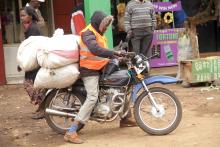International agencies and national governments have overlooked how effective local transport providers can be in helping stop the spread of ebola in affected Central African companies.
Much advice has been given to airlines about how to clean and disinfect their airplanes and to hand out advice. But the majority of people in Guinea, Sierra Leone, Liberia and Nigeria don’t take airplanes. They take local transport, said Heather Allen, programme director for sustainable transport at the London-based Transpo
International agencies and national governments have overlooked how effective local transport providers can be in helping stop the spread of ebola in affected Central African companies.
Much advice has been given to airlines about how to clean and disinfect their airplanes and to hand out advice. But the majority of people in Guinea, Sierra Leone, Liberia and Nigeria don’t take airplanes. They take local transport, said Heather Allen, programme director for sustainable transport at the London-based Transport Research Laboratory (777 TRL).
“There appears to be a lack of guidance for urban and rural transport on a national level,” said Allen, who has written an article on the subject posted on %$Linker:2 External <?xml version="1.0" encoding="utf-16"?><dictionary /> 0 0 0 oLinkExternal the TRL website Visit reports publications page false http://www.trl.co.uk/reports-publications/ false false %>.
“Generally passenger transport in much of Africa is not sanitised. Meaning you do not have the privilege to travel in the comfort in your own car. Most of the population has to use the local public transport to get to work, education, markets or to make the visit to the hospital or health centre and this means using taxis, minibuses or motorcycles.”
Allen said the TRL can help international agencies formulate and disseminate guidelines to transportation owners and operators, such as for over-crowded mini-buses and motorcycle taxis. Advice can cover how vehicles should be cleaned but also how to hand out information to passengers on what they should do to remain clear of the virus.
“Transport operates in exactly the places where governments can get the message out to their citizens as they go about their daily lives. Targeting public transport hubs could be a very effective way to help communicate the basic principles on how to avoid infection especially in urban and semi-rural areas,” she said.
Allen urged a review of3263 World Health Organisation guidelines and putting this into the transport context could help save lives. “Providing simple guidelines on how to help contain the disease with some basic steps do not yet seem to be part of any plans.”
Typical guidelines could include encouraging transport operators to clean down and disinfect the surfaces of their vehicles daily or providing these facilities. Decontamination with dilute bleach is thought to be effective and readily available even in remote settings.
The provision of simple guidelines to passengers about wearing gloves and masks, closing your eyes if someone sneezes next to you, as droplets from a sneeze going directly into the eye, for example, could transmit the virus. Broken skin and the membranes of the mouth and inside of the nose are particularly vulnerable and these should be protected.
Sanitising your hands after travelling on public transport could also help. Printing messages for operators to display about where to get more information and what citizens should be looking for would inform people and possibly contain the further spread of the disease
Much advice has been given to airlines about how to clean and disinfect their airplanes and to hand out advice. But the majority of people in Guinea, Sierra Leone, Liberia and Nigeria don’t take airplanes. They take local transport, said Heather Allen, programme director for sustainable transport at the London-based Transport Research Laboratory (
“There appears to be a lack of guidance for urban and rural transport on a national level,” said Allen, who has written an article on the subject posted on %$Linker:
“Generally passenger transport in much of Africa is not sanitised. Meaning you do not have the privilege to travel in the comfort in your own car. Most of the population has to use the local public transport to get to work, education, markets or to make the visit to the hospital or health centre and this means using taxis, minibuses or motorcycles.”
Allen said the TRL can help international agencies formulate and disseminate guidelines to transportation owners and operators, such as for over-crowded mini-buses and motorcycle taxis. Advice can cover how vehicles should be cleaned but also how to hand out information to passengers on what they should do to remain clear of the virus.
“Transport operates in exactly the places where governments can get the message out to their citizens as they go about their daily lives. Targeting public transport hubs could be a very effective way to help communicate the basic principles on how to avoid infection especially in urban and semi-rural areas,” she said.
Allen urged a review of
Typical guidelines could include encouraging transport operators to clean down and disinfect the surfaces of their vehicles daily or providing these facilities. Decontamination with dilute bleach is thought to be effective and readily available even in remote settings.
The provision of simple guidelines to passengers about wearing gloves and masks, closing your eyes if someone sneezes next to you, as droplets from a sneeze going directly into the eye, for example, could transmit the virus. Broken skin and the membranes of the mouth and inside of the nose are particularly vulnerable and these should be protected.
Sanitising your hands after travelling on public transport could also help. Printing messages for operators to display about where to get more information and what citizens should be looking for would inform people and possibly contain the further spread of the disease










